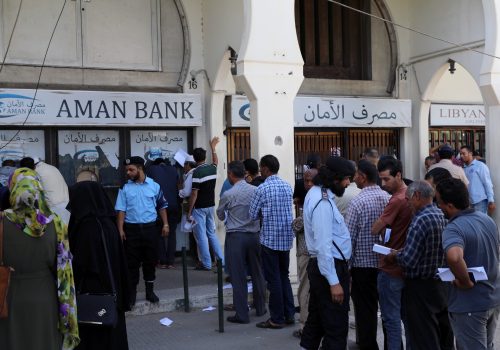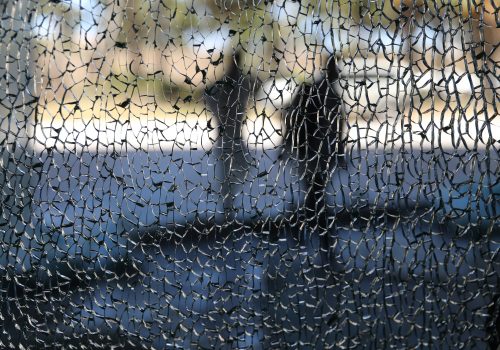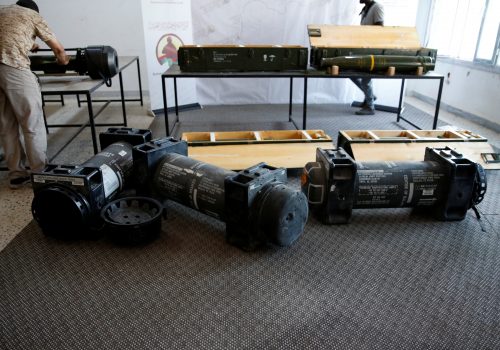How the exclusion of women has cost Libya
At a recent United Nations Security Council (UNSC) meeting on November 18, 2019 concerning Libya, members were privileged to hear from Rida Al-Tubuly, advocate for peace and co-founder of Together We Build It, a nonprofit that supports a peaceful democratic transition in the country by empowering women to play an active role in peace-building. Ms. Tubuly addressed the systematic exclusion of Libyan women from the UN-led peace process and suggested a different path forward.
Libya experts frequently call for greater inclusion of civil society and local governance leaders in peace-building efforts in order for the peace process to be more representative of ordinary Libyans. And yet, Libyan women’s powerful role in civil society and the fact that they make up half of the population of “ordinary Libyans” is often overlooked. For the peace process to be truly “by and for” Libyans and successfully advance a long-term solution, a broad and diverse range of Libyan women must be given a seat at the negotiating table.
Why have women been excluded from the peace process?
As Ms. Tubuly explained to UNSC members, “[Libyan women] are often told by international decision makers that the reason women are excluded from formal peace and political negations is because the ‘Libyan actors’ are against women’s political participation.” This begs the question: “if there are no means for ordinary Libyans to take part in the political process, then how will we be able to change things on the ground?” It is misguided and reductive to imagine that the majority of Libyans are opposed to women’s involvement in the peace process. Women’s inclusion is not just a feminist issue, it is an issue of reflecting Libya’s national culture and traditions in the peace process.
Libyan women have long played a key role in negotiating or mediating conflicts within families, clans and local communities. This legacy is often overlooked because it lives in local cultures through oral history rather than written documentation, according to Zara Langhi, scholar and head of Libyan Women’s Platform for Peace. Women also play an outsize role in civil society organization and activism in Libya—indeed, nonviolent action by urban women was central to the 2011 uprising that ousted former Libyan President Muammar Qaddafi. Libyan women’s active engagement in the revolution empowered their political and social status, but the chaos and dysfunction of the post-revolution era led to backsliding in women’s empowerment.
War-related insecurity has in many instances limited women’s freedom of movement in public. Traditional and religious injunctions against women traveling without a male guardian (mahram) have been invoked in some areas. Further, patriarchal strains of Libya’s culture have fused with the ideas of masculinity, militarism, and fundamentalism promoted by the violent conflict, giving rise to political actors with interests and objectives that exclude women. These factors created obstacles to women’s participation in political activities, but women found ways to overcome them. Women facilitate many of the informal peace processes throughout the country and are active organizers for peace. However, their formal participation in the peace process is further hindered by the UN’s neglect in the post-revolutionary period.
How does the ongoing violence affect Libyan women?
Libya’s local and regional diversity means that women’s experience throughout the country is highly variable. However, it is important to address the conflict’s differential effect on women. The war has led to a loss of gains in women’s rights and political empowerment. Women who do participate in politics are increasingly at risk: Seham Serghewa, a rights activist and member of the House of Representatives, was abducted in July and her fate remains unknown to investigators. As UN Special Representative for Libya Ghassan Salame noted in his briefing to the UNSC on November 19, Ms. Serghewa’s fate is part of a “larger pattern of violence against women across the country” that includes several instances of killing and forced disappearances in recent months. Women are among the civilians that bear the brunt of the conflict and are also increasingly at risk of sexual and gender-based violence, but, as Libyan women’s organizations have pointed out, the absence of gender disaggregated data on conflict casualties and sexual and gender-based violence among women serves to further their marginalization and the erasure of the gendered impact of armed conflict.
Libyan women have ideas for a path forward in their country, and deserve to have their input amplified at an official level.
The attack on Tripoli in April by Field Marshal Khalifa Haftar and the Libyan National Army (LNA) significantly impacted women and girls. Of the 90,500 civilians displaced by first month of the offensive, an estimated 51 percent were female; they face disproportionate risks in shelters and internally displaced peoples camps that lack safe places, privacy, security and freedom from harassment. Most women and children displaced from Tripoli and its surrounding areas are traumatized by the ongoing conflict and in need of some form of psychosocial support, and an estimated 400 women are at risk of sexual violence in this environment. And if the ongoing conflict creates security vacuums in the rest of the country that Salafi jihadist militants can exploit, the impact on women’s rights and security in those locales could be devastating. It would also be remiss to omit the fact that women migrants and refugees in Libya are at risk of rape and other forms of sexual and gender-based violence, sexual exploitation, and forced prostitution in detention and at large.
The increased instance of sexual and gender-based violence during conflict is not a phenomenon unique to Libya: the UN has noted that violence against women and girls is widespread during conflict and used as a war tactic worldwide. Wartime rape, trafficking, forced prostitution, and violence targeting women is frequently used as a strategy of war; it not only terrorizes women but also contributes to male humiliation when men fail to protect “their women.” Continued conflict in Libya poses special threats to the security of women and girls.
Why should the UN include more women in the peace process?
Women must be included in peace processes not necessarily because they are inherently peaceful, but because they have unique meditation and negotiation skills imbued by their culture, are equal stakeholders in peace with men, are highly motivated to terminate conflict given the differential effect of war on women. This is true in Libya, where women have overcome great odds to play an important role in peacebuilding. However, their absence or diminished presence at UN-led international conferences like Palermo and Paris meant that no space was made for a representative range of Libyan women to contribute their experiences, perspectives, and ideas to the formal decision-making process.
Not until 2015 did the Special Representative for Libya at the time, Bernardino León, instruct that “women must get involved in talks at the municipality and tribal level.” While no mention was made of their inclusion in the formal process, some progress has been made in terms of women’s role in local dialogues since then. The Libyan National Conference Process, which was initiated at the request of the UN Support Mission in Libya (UNSMIL) under the auspices of the Centre for Humanitarian Dialogue, held more than seventy separate meetings of local leaders with a grand total of more than 7,000 Libyans participating; over a quarter of whom were women. While 25 percent is not representative or sufficient, the increase in women’s involvement was an improvement. One outcome of women’s participation in the meetings was the inclusion of references to women in the final report of the conference, including the recommendation that “women should be integrated into the military according to Libyan social needs and norms in order to improve the military’s effectiveness.” This is a great idea: women’s participation in the security sector has been shown to improve community relations, provide mission-critical intelligence and insights, and reduce sexual violence. These are the types of women-driven initiatives the peace process is lacking in and could benefit from if women’s presence was representative. The National Conference Process meetings were widely seen as more successful than their international counterparts, and women’s participation in them—while still not at parity—was likely a causal factor.
Research shows that women’s active participation in a peace process makes it 64 percent less likely to fail, and 35 percent more likely to last at least fifteen years. The inclusion of women at the negotiating table can produce agreements that improve gender equality, which in turn decreases conflict between and within states, increases stability, and promotes post-conflict recovery. Despite the evidence of women’s valuable contribution to peace and security, their representation has only marginally improved. Worldwide since 1992, women have made up only 3 percent of mediators, 4 percent of signatories, and 13 percent of negotiators.
UNSMIL and the international community would do well to consider the evidence of women’s utility in peace processes and make a concerted effort to include them at international fora like the forthcoming Berlin conference, as well as increasing their participation in national dialogues. Furthermore, as long as elections are not possible, UNSMIL must be creative in facilitating and leading a political process that is gender-inclusive. To restore power to ordinary Libyans, the peace process must be reconfigured: women must have representation at the negotiating table as well as in dynamics on the ground. Libyan women have ideas for a path forward in their country, and deserve to have their input amplified at an official level. Not only that, Libya deserves the kinds of solutions women can drive forward.
Emily Burchfield is an assistant director at the Atlantic Council’s Middle East Programs.
Image: Libyan women with taped mouths take part in a silent march in support of the women who were raped during the recent war in Libya, in Tripoli November 26, 2011. REUTERS/Mohammed Salem


